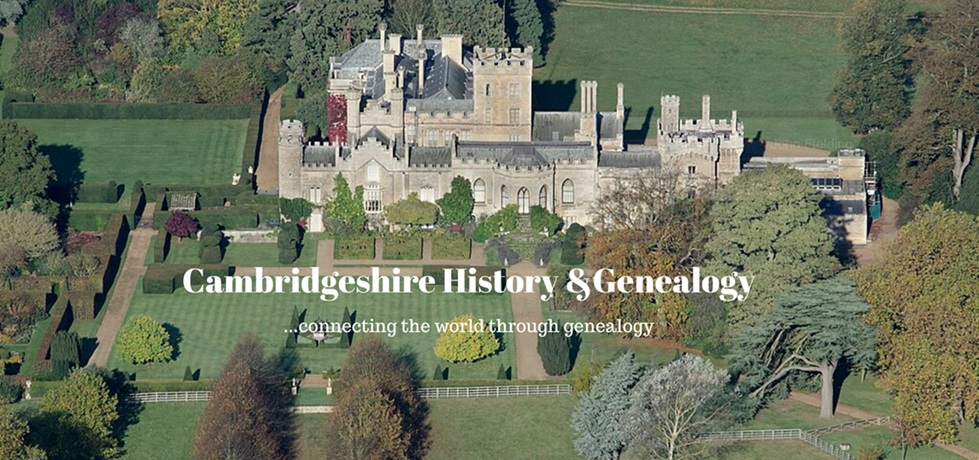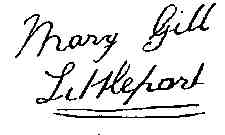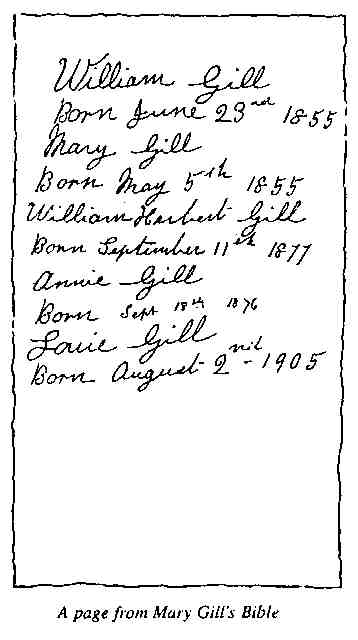The Barritts of the Fenlands - Page 15
Mary Ann Barritt, daughter of George and Martha
Mary Ann Barritt, daughter of George and Martha Mary was born 5th May 1855 on Feltwell Fen and like her cousin John Barritt was baptised in the recently opened Primitive Methodist Chapel at Brandon Creek on 26th June 1855.
Mary married William Gill on 3rd November, 1876 at St. John little Ouse, just over a year after her mother died. Mary and William lived at Brandon Creek where their only child, William Herbert, was born 11th September, 1877.
About the year 1880 they moved to a small cottage at Padnal, Littleport, quite close to the railway line and also to Sandhill Bridge, which crosses the River Great Ouse and leads to Padnal Fen. This cottage still exists and is part of the property of Jacques Cable Systems.
The following was written by Mary and William Gill's grandchild, Louie Gill, when she was in her 80's and are her memories of them:
I am the grand-daughter of Mary Barritt and William Gill. I was born in 1905 - the only grandchild by the only child of William and Mary Gill of Littleport. My grandmother was blind and as well as passing on to me much of her family history, she also bequeathed her short-sightedness.
My grandmother was a wonderful woman and coped all her life with her disabilities - she also lost an arm when she was eighteen! That's a story in itself! I never heard her moan or say that she couldn't manage. She was very short sighted even as a child and later became practically blind. Could just distinguish light from dark in later years. Was one of the youngest children, evidently very close to her mother, probably because of her sight handicap. She could not join in lots of children's games and so became her mother's companion. Apparently not too well off, her mother could only afford a cup of tea on "wash-days" when she was exceptionally tired. Tea was 121- an oz so was a great treat. Sometimes food was scarce, but mother looked well after her brood and on a cold winter's morn, sometimes when times were very lean, breakfast was bread soaked in hot water and pepper and salt to taste. At least they were warmly fortified before turning out in the cold.
Grandma was not able to work in the usual way, so, simply because she could read and write, and others couldn't, she started a "Dame School". I think id weekly When I was a child, she still had slates and some of the books that were then used. What a pity that they were destroyed. She must have met my grandfather William when she was very young. He used to "court her" with a whistle! which I still have - metal with a pea in the vent! I think that this must have been because she couldn't see him and perhaps could slip out on the QT without mother knowing. That's the only reason I can think of. At eighteen, she was very gay, had a good singing voice and was evidently always ready for a lark. At Ely Fair she, with three other friends, one with a small baby. went in a pony trap - on the spree. On the return journey they came to the Queen Adelaide open crossing - and did not hear the train. The woman with the baby threw it into a ditch and it landed safely - she was killed as were her companions, except grandma. Her arm was very badly damaged, but fortunately the people from The Queen Adelaide Pub came to the rescue and the land-lady was a nurse. Fortunate indeed for grandma. The doctor decided to amputate the arm at the shoulder, but the nurse would not agree, stressing that if it could be saved below the elbow, she would be able to help herself so much more. This was indeed done. Gran recovered, wore a sort of cover with a steel end, onto which she screwed her gloved hand when she went out of doors.
She was a wonderful woman, quiet in manner, yet good conversationally and quite volatile at times. Never once did I hear her moan and nothing except cutting bread, handicapped her. She even knitted and sewed while her sight lasted - and she was a jolly good cook - all on an open fife.
My father was born when she was twenty one. He did have one accident owing to her poor sight. As a small baby he was lying on the rug in front of the fire and a cinder fell on his throat and made a small burn. I think his father came in before much damage was done and saw what had happened.
Chapel was the be-all and end-all of the week. Both were sincerely religious and pillars of the chapel in the very best way. Grandfather went to Morning and Evening service - Grandma to Afternoon and Evening - and me - I always had to remember the text! No work was done on Sunday at all. No salads from the garden - no fruit from the trees. All was gathered in and prepared on Saturday night. Even the fire was let out and relayed ready for Sunday am. The joint was often taken to the bake-house in the very hot weather, when a fire was unbearable, and collected after chapel.
After dinner, grandfather got out the old Bible, read the morning's reading to grandma and then all was quiet and peaceful.
In Littleport all work stopped daily when the 2.30 train from Ely-Lynn came along. The men I suppose started work so early -some times by 4 and 5 o'clock, and the fenland heat was so intense, with no shade, that in the middle of the day they were more than ready to "knock off', have a wash (read from the Bible passage always) and a rest and then in the cool of the evening, attend to their own gardens arid animals and go to the "Black Horse" for a bit of night life!
My grandparents seemed reasonably well off. Grandfather bad his vegetables, his hens and an acre of land on which he grew corn. He let the field in front of the house, and always made himself responsible for the payment of all household bills. In spite of everything they had a good life together and as far as I know, never wanted for anything.
Grandma talked a lot to me about her early life and I always felt that she was very attached to, and had a great admiration, for her mother. I think that they were very close - probably because of her poor eyesight, even in those early days - which made her someone special and to be looked after. I cannot remember any reference to her father - but I may have forgotten.
What always amazes me is the fact that the house must have been quite well equipped, yet they must have been desperately poor, or so I imagine - you see, as I have told you previously.
I have her oak bureau, a lovely copper warming pan and the remains of the tea service which appear to be either Japanese or Chinese (where did they come from?) and grandma used to use this regularly on special occasions. It's amazing that it has lasted so long. Then I have her Bible, her needle case (oak) which is very worn and a whistle. I have also my father's christening robe and baby hair brush. It does seem such a pity that no one will really care for these things - apart from the larger ones -when I am gone.
Well, it's nearly my birthday - when we should be going to Littleport. Grandma would be waiting at the stile to see the train go by and we fluttered a white hanky. Sometimes, if the light was good, she'd see it and put the kettle on! Grandfather would be on the platform to meet us and sometimes, if the Gypsies were not there, we'd go via the Black Horse Drove, a quicker way than the main street.
On my birthday, she'd bake a cake, get the tea service washed and out, and always someone from along Sandhill would bring me a bowl of the last raspberries or currants. It was a lovely day. The sun always shone and a lovely memory. I wish that I could repeat it.
Louie Gill, 1986.
William Gill, who was seven weeks younger than Mary, had lived with his uncle William Crow at Southery after his parents died when he was quite young. The Crow family lived on Southery Fen, west of the Great Ouse, and in April 1871, when he was 16, he was employed as a field worker. William remained a farm worker for the rest of his working life.
Some time in the 1930's William and Mary left their cottage in Padnal and moved to No.5 Alms House, next to Littleport Town Hall. Both were admitted to the Tower Hospital at Ely where they died. William was buried in Littleport Cemetery, 18th March, 1937 and Mary on 1st November, 1939.
William Herbert Gill went to Nottingham about the year 1894 and lived with his aunt Rachel who had recently married a Lace Maker, George Ducker Sowter. For a time he worked with George, who was Best Man when William married Annie Caunt at St. Andrew's, Nottingham on 18th May, 1901.
William Herbert remained in the lace business, moved to Long Eaton in Derbyshire, and lived and worked there as a lace maker's warper. William and Annie had one child, Louie, born 2nd August, 1905, who was taken to Littleport, where she was baptised at the Primitive Methodist Chapel there, two days after her seventh birthday. William Herbert died 15th October 1959 and Annie died 3rd November 1967.
© Ron Barritt - March 1995



